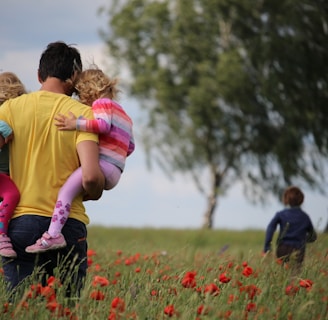Celebrating Fatherhood: The Vital Role of Dads and Male Role Models in Child Development
Father's Day is more than a date on the calendar; it's a heartfelt acknowledgment of the profound impact fathers and male role models have on shaping the lives of children. As we honor these influential figures, it's essential to understand their unique contributions to child development and the lasting impressions they leave.
5/28/20253 min read


The Influence of Fathers in Child Development
Fathers play a distinct and irreplaceable role in their children's lives. Research indicates that children with actively involved fathers experience:
Enhanced Cognitive Development: Engaged fathers contribute to higher IQs and better language skills in their children.
Improved Emotional Well-being: A father's nurturing presence fosters emotional security and resilience.
Better Social Skills: Regular interaction with fathers enhances children's ability to relate to others and develop healthy relationships.
Academic Success: Children with involved fathers are more likely to achieve higher grades and exhibit positive behavior in school.
The Science Behind Father-Child Bonding
Modern developmental psychology has uncovered just how essential fathers are from the earliest stages of a child’s life. While mothers are traditionally seen as the primary caregivers, fathers offer complementary forms of support that contribute to a child’s full development.
Fathers are more likely to engage in “rough-and-tumble” or physical play, which teaches children to regulate emotions, take measured risks, and develop physical confidence. Studies show this form of play improves a child’s ability to navigate complex social situations later in life.
The Father Involvement Research Alliance (FIRA) found that fathers who engage in consistent caregiving activities raise children with higher levels of empathy and cognitive flexibility. Neuroscience even shows biological evidence of paternal bonding: involved fathers experience hormonal shifts (e.g., increases in oxytocin and prolactin) that enhance emotional sensitivity.
Importantly, daughters with nurturing fathers demonstrate higher self-esteem and academic resilience. Sons benefit by learning healthy models of masculinity, respect, and emotional openness.
Real-Life Impact of Positive Male Role Models
Beyond biological fathers, positive male role models—such as uncles, teachers, coaches, and family friends—play a crucial role in a child's upbringing. Their presence can:
Provide diverse perspectives
Promote healthy masculinity
Encourage academic and social aspirations
Community programs like Big Brothers Big Sisters show that mentored children are more likely to graduate, avoid risky behaviors, and build emotional intelligence. Boys benefit from learning strength through empathy. Girls benefit by observing emotionally available and respectful masculinity.
Culturally diverse role models further enhance empathy and global awareness in children, helping them grow into compassionate and inclusive adults.
Comparing Parenting Styles: Fathers and Mothers in Harmony
Parenting is a partnership where different approaches harmonize to support well-rounded development in children. While mothers often focus on emotional regulation and verbal nurturing, fathers may promote autonomy and resilience through physical engagement and boundary-setting.
According to the American Psychological Association, dual-parent involvement yields greater academic and emotional resilience than any single caregiving style. Children raised by both parents learn that love and structure come in many forms.
In single-parent or non-traditional households, diverse adult figures can fill these roles to provide a balanced, emotionally rich upbringing.
Fatherhood Across Cultures: Shared Roots, Diverse Practices
Fatherhood is universal, but its expression varies globally:
Sweden/Norway: Generous paternity leave normalizes male caregiving.
East Asia: Fathers traditionally emphasize education and provision, but modern trends include more emotional involvement.
Latin America: The "machismo" culture is evolving, with dads embracing nurturing roles.
Africa & Indigenous Communities: Communal fatherhood means uncles and male elders share child-rearing roles.
These global insights teach us that while cultural expectations differ, the values of presence, care, and guidance are universal.
The Evolving Role of Fathers in Modern Society
id
Today’s fathers are not just providers; they are active co-parents, emotional guides, and educators. Younger generations are especially likely to reject outdated masculine norms, embracing tenderness, participation, and shared domestic duties.
Remote work and shifting social expectations have enabled dads to witness more family milestones and share everyday parenting. Modern fathers read bedtime stories, attend school events, and change diapers — all with pride.
Research from the University of Illinois shows that children with emotionally available fathers display greater academic success and fewer behavioral issues.
Today’s dads are reshaping masculinity by showing that strength also means presence, patience, and love.
Recommended Reading on Fatherhood
Strong Fathers, Strong Daughters by Meg Meeker
The New Father: A Dad's Guide to the First Year by Armin A. Brott
The Role of the Father in Child Development by Michael E. Lamb
Fathers and Children Together by Jay Fagan and Glen Palm
Father’s Day Gift Guide
Dad’s Survival Kit (Fun Gift Set)
Final Thoughts & A Call to Celebrate Fatherhood
Fatherhood is more than a role — it's a relationship that molds the next generation. From roughhousing and discipline to deep talks and bedtime snuggles, dads teach lessons that stay with children for life.
This Father's Day, go beyond gifts:
Write a heartfelt letter
Share a memory
Spend time doing what he loves
Let's uplift and honor the fathers and role models who have shaped us — not just with gifts, but with gratitude, presence, and love. Their legacy is written in every child they nurture.
Happy Father's Day — today and every day.
Inspiration for family success
Explore family living and conscious lifestyles.
© 2025. All rights reserved.
